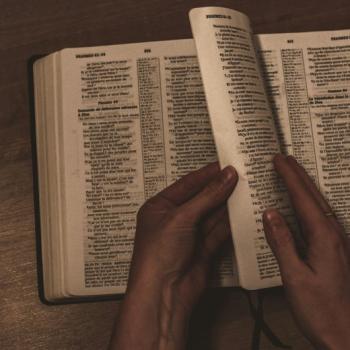The Father and the Son (Jn. 5:19-24); Resurrection and Judgment (5:25-29)
These sections introduce themes that are much more fully developed in John 11:1-44. I will therefore reserve a detailed discussion of these concepts until my explorations of that chapter. At this point I will briefly introduce these themes:
- The Son does nothing on his own, but only what he sees the Father doing (5:19).
- The Father reveals to the Son all that he is doing (so that the Son can do what the Father does) (5:20).
- The Father raises the dead, so the Son can raise the dead (5.21).
- The Father gives all judgment to the Son (5:22).
- The dead will be resurrected and the Son will judge them (5:24-29).
Within the context of chapter five, the point of these ideas is that the Son heals on the Sabbath only because he imitates the Father's Sabbath acts. Furthermore, not only can the Son heal by the will of the Father, but can raise and judge the dead, the ultimate manifestation of divine power. This chapter is thus in part a prophecy and foreshadowing of the sermon, and the raising of Lazarus from the dead in chapter 11, as well as Jesus' own resurrection.
The Three Witnesses (Jn. 5:30-38)
In 5:30-38, Jesus discusses three witnesses that support this claim that he is the messiah. Why does Jesus need witnesses? Jesus explains: "If I alone bear witness about myself, my testimony is not deemed true" (5:31). Anyone can claim to be the Messiah, and, in fact, during the century surrounding the life of Jesus, many Jews did. Although today we often view ancient people as rather gullible and credulous, many were often as hardheaded and skeptical as moderns. When Jesus claimed to be the Messiah, the natural response for many was: "Prove it!" And in John 5 that is precisely what Jesus sets out to do.
But the issue is more complicated than mere skepticism. The book of Deuteronomy has an important section providing the Jews with a specific test for false prophets to which Jesus is alluding here.
But the prophet who presumes to speak a word in my name that I have not commanded him to speak, or who speaks in the name of other gods, that same prophet shall die. And if you say in your heart, 'How may we know the word that the YHWH has not spoken?'—when a prophet speaks in the name of the YHWH, if the word does not come to pass or come true, that is a word that the YHWH has not spoken; the prophet has spoken it presumptuously. You need not be afraid of him (Dt. 18:20-22). (emphasis added)
In John 5 Jesus is offering a prophecy, and thereby establishing a metric by which his messianic claims can be tested by his critics. His prophecy is:
Greater works than these [the healing at Bethesda] will he [the Father] show him [the Son], so that you may marvel. For as the Father raises the dead and gives them life, so also the Son gives life to whom he will. . . . .Truly, truly, I say to you, an hour is coming, and is now here, when the dead will hear the voice of the Son of God, and those who hear will live (Jn. 5:20-21, 25).
The first part of Jesus' prophecy is that he will raise the dead. He is thus providing a test case by which his critics can determine if he is a true prophet according to the criteria provided in Deuteronomy 18:20-22. If Jesus raises the dead he is a true prophet, and hence is the Messiah. If he does not, he is a false prophet, and hence is worthy of death (Dt. 18:20b).
Furthermore, raising the dead was understood by Jews to be the exclusive prerogative of God (Dt. 32:39; 1 Sam. 2:6; 2 Kgs. 5:7; Tobit 13:2; Wisdom 16:13). Hence, if Jesus raises the dead, he is clearly sent by the Father. Furthermore, the story of the raising of the dry bones in Ezekiel 37:1-15 is a foundational passage regarding the resurrection of the dead, and it is accomplished by the bones hearing the voice of the "Son of Man" (Ezek. 37:3) who commands the dead to arise by the will of God.
This is a crucial concept for John, because Jesus does fulfill his prophecy by raising Lazarus from the dead (Jn. 11:38-44), and thus demonstrates that he is a true prophet. And yet, Caiaphas the High Priest and the Sanhedrin plot to put him to death precisely because raising Lazarus fulfilled the Deuteronomic requirement for a true prophet (Jn. 11:45-53, 12:9-11). This is why the raising of Lazarus is such a pivotal incident in John. But their execution of Jesus only serves to further prove he is the Messiah through his own subsequent resurrection, because "the Son has life in himself" (5:26b). The second part of Jesus' prophecy is the resurrection of the dead, which commences with his own resurrection.
Deuteronomy also presents a principle that two or three witnesses shall be required to establish the truthfulness of claims in legal proceedings: "Only on the evidence of two witnesses or of three witnesses shall a charge be established" (Dt. 17:6, 19:5; cf. Num. 35:30; Jn. 8:13-18; 2 Cor. 13:1). As another demonstration of the authenticity of his prophetic claims, Jesus therefore presents three witnesses who support his claim to be the Messiah: 1) the testimony of John the Immerser (5:31-36); 2) doing the works of the Father (5:36-38), that is, his miraculous signs; and 3) the scriptures and prophecies of Moses (5:39-47).





